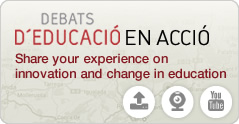- Català
- Español
- English
You are here
Creating schools that prepare for the future
About the speaker
Richard Gerver
Former head of Grange primary school, Long Eaton, UK, and an expert in leadership, creativity and organizational change
Main ideas
Richard Gerver, former head of Grange primary school, Long Eaton, UK, and expert in leadership, creativity and organizational change, believes that there are three key concepts that should shape the schools of the future: living, learning and laughing.
Living
Schools must ensure that pupils live their lives to the full; that they hold their heads high, find out what they’re interested in and make the most of their skills and potential; that they find out who they are as individuals and as members of a group. All this has nothing to do with passing exams and getting good results.
Schools should reflect what pupils expect from them (the book entitled The school I would like is a collection of the opinions of young people from all over the UK about what their ideal school would be like).
Schools should not be about control, but about providing students with the tools they need for empowerment.
If we want children and young people to be innovative, to take risks, to want change, the first people who have to accept this challenge to change are the teachers, who are too often afraid of the risk and of changing the way they teach.
Learning
Education is one of the most valuable assets that a society can offer. But today’s education is based on teaching pupils how to pass exams, not how to really learn. This kind of education doesn’t motivate students (“you have to learn to be able to pass exams, which will let you go on learning to sit more and harder exams, which will let you go to university to continue learning to pass exams”). It is no surprise that so many young people want to leave the system: “I don’t want to take any more exams.”
The learning has to be motivating, it has to be exciting and it has to be important at the time. Children and young people don’t think about the future. Learning has to offer something irresistible now.
There cannot be a one-size-fits-all type of education and it can’t be decided by politicians and unions. Education has to be adapted to each child and young person, and to their particular situation, and it has to the teacher who decides what this educations should be like. Our educational system should be designed with children’s development in mind.
Not all children are good at passing exams, but they all have potential that has to be brought to light and made the most of.
Laughing
The learning environment has to be fun. Children have to have a good time.
Fear and control should not be hallmarks of education. Students who are scared cannot give their best. In a cheerful environment, students are more open and learn mutual respect.
Classical education leads to failure
Gerver believes that “classical formal education, based on passing exams, does not produce creative and innovative people prepared for the future that they will face in the 21st century, but people who are accustomed to being managed (used to being told what they have to learn and how they have to learn). Classical education leads to many people failing, because they expect to be managed”.
He gave an example of a changing trend. “China is one of the countries that gets the best results in the PISA report because it teaches people to pass exams. […] The challenge we face is to create educational systems for the 21st century which show how the world is there for the taking and that it is the young who invent their future, building on smiles and lifelong learning.”
This Debate on Education is sponsored by Obra Social "la Caixa" and its Internationalization at Home Plan.
Discover
other ideas
-

Collaborate, innovate and lead. The future of the...
John MacBeath
2013 -

Is privatization the solution? Challenges and tens...
Henry Levin
2013 -

The role of families in improving schools and the...
Annie Kidder
2013






 The texts published on this website are, unless otherwise indicated, covered by the Creative Commons Spain Attribution - Non Commercial - No Derivs 3.0 licence. You may copy, distribute and transmit the work, provided you attribute it (authorship, journal name, publisher) in the manner specified by the author(s) or licensor(s). You may not use the material for commercial purposes. You may not transmit any derivative work from this material. The full text of the licence can be consulted here:
The texts published on this website are, unless otherwise indicated, covered by the Creative Commons Spain Attribution - Non Commercial - No Derivs 3.0 licence. You may copy, distribute and transmit the work, provided you attribute it (authorship, journal name, publisher) in the manner specified by the author(s) or licensor(s). You may not use the material for commercial purposes. You may not transmit any derivative work from this material. The full text of the licence can be consulted here: